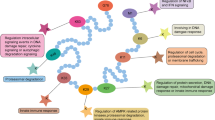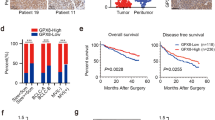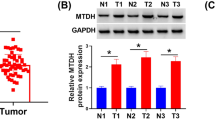Abstract
Purpose
Deubiquitination, the inverse process of ubiquitination, is catalyzed by deubiquitinases (DUBs) that remove ubiquitin from target proteins and subsequently prevent their degradation by proteasomes. Previously, deubiquitination has been found to be involved in hepatocellular carcinoma (HCC) progression. As yet, however, little is known about the exact role of deubiquitination in the development and/or progression of this type of cancer.
Methods
HCC tissues and tissue microarrays were used to detect expression of the DUB ubiquitin-specific protease 2a (USP2a). The critical role of USP2a in HCC development and progression was assessed in both in vitro cell and in vivo animal models. LC-MS/MS analyses were performed to identify potential targets of USP2a in HCC cells, after which regulation of target protein stability and ubiquitin status by USP2a were investigated.
Results
We found that USP2a was significantly upregulated in HCC tissues, and that a high expression was positively associated with a poor prognosis. Subsequently, we found that USP2a silencing resulted in inhibition of HCC cell proliferation, migration and invasion, whereas exogenous USP2a overexpression resulted in the opposite effects, both in vitro and in vivo. Mechanistically, LC-MS/MS analysis revealed that RAB1A, a key regulator of the ER and Golgi vesicular transport system, serves as a potential target of USP2a in HCC cells. In addition, we found that USP2a can deubiquitinate and stabilize RAB1A and prevent its degradation, and that this process is required for inducing HCC progression by USP2a.
Conclusions
Our data indicate that USP2a can promote HCC progression via deubiquitination and stabilization of RAB1A. This observation indicates that DUB targeting may serve as a novel approach to improve the treatment of HCC.







Similar content being viewed by others
References
F. Bray, J. Ferlay, I. Soerjomataram, R.L. Siegel, L.A. Torre, A. Jemal, Global cancer statistics 2018: GLOBOCAN estimates of incidence and mortality worldwide for 36 cancers in 185 countries. CA Cancer J. Clin. 68, 394–424 (2018)
J.D. Yang, P. Hainaut, G.J. Gores, A. Amadou, A. Plymoth, L.R. Roberts, A global view of hepatocellular carcinoma: trends, risk, prevention and management. Nat. Rev. Gastroenterol. Hepatol. 16, 589–604 (2019)
A. Forner, M. Reig, J. Bruix, Hepatocellular carcinoma. Lancet 391, 1301–1314 (2018)
J.M. Llovet, R. Montal, D. Sia, R.S. Finn, Molecular therapies and precision medicine for hepatocellular carcinoma. Nat. Rev. Clin. Oncol. 15, 599–616 (2018)
C. Berasain, Hepatocellular carcinoma and sorafenib: too many resistance mechanisms? Gut 62, 1674–1675 (2013)
E. Oh, D. Akopian, M. Rape, Principles of ubiquitin-dependent signaling. Ann. Rev. Cell Dev. Biol. 34, 137–162 (2018)
J.J. Sacco, J.M. Coulson, M.J. Clague, S. Urbe, Emerging roles of deubiquitinases in cancer-associated pathways. IUBMB Life 62, 140–157 (2010)
J.A. Harrigan, X. Jacq, N.M. Martin, S.P. Jackson, Deubiquitylating enzymes and drug discovery: emerging opportunities. Nat. Rev. Drug Discov. 17, 57–78 (2018)
A. Pal, M.A. Young, N.J. Donato, Emerging potential of therapeutic targeting of ubiquitin-specific proteases in the treatment of cancer. Cancer Res. 74, 4955–4966 (2014)
Y. Ma, H.L. Fu, Z. Wang, H. Huang, J. Ni, J. Song, Y. Xia, W.L. Jin, D.X. Cui, USP22 maintains gastric cancer stem cell stemness and promotes gastric cancer progression by stabilizing BMI1 protein. Oncotarget 8, 33329–33342 (2017)
W. Li, K. Cui, E.V. Prochownik, Y. Li, The deubiquitinase USP21 stabilizes MEK2 to promote tumor growth. Cell Death Dis. 9, 482 (2018)
J.B. Cai, G.M. Shi, Z.R. Dong, A.W. Ke, H.H. Ma, Q. Gao, Z.Z. Shen, X.Y. Huang, H. Chen, D.D. Yu, L.X. Liu, P.F. Zhang, C. Zhang, M.Y. Hu, L.X. Yang, Y.H. Shi, X.Y. Wang, Z.B. Ding, S.J. Qiu, H.C. Sun, J. Zhou, Y.G. Shi, J. Fan, Ubiquitin-specific protease 7 accelerates p14(ARF) degradation by deubiquitinating thyroid hormone receptor-interacting protein 12 and promotes hepatocellular carcinoma progression. Hepatology 61, 1603–1614 (2015)
C. Qiu, Y. Liu, Y. Mei, M. Zou, Z. Zhao, M. Ye, X. Wu, Ubiquitin-specific protease 4 promotes metastasis of hepatocellular carcinoma by increasing TGF-beta signaling-induced epithelial-mesenchymal transition. Aging 10, 2783–2799 (2018)
E. Graner, D. Tang, S. Rossi, A. Baron, T. Migita, L.J. Weinstein, M. Lechpammer, D. Huesken, J. Zimmermann, S. Signoretti, M. Loda, The isopeptidase USP2a regulates the stability of fatty acid synthase in prostate cancer. Cancer Cell 5, 253–261 (2004)
L.F. Stevenson, A. Sparks, N. Allende-Vega, D.P. Xirodimas, D.P. Lane, M.K. Saville, The deubiquitinating enzyme USP2a regulates the p53 pathway by targeting Mdm2. EMBO J. 26, 976–986 (2007)
Z. Liu, S.M. Zanata, J. Kim, M.A. Peterson, D. Di Vizio, L.R. Chirieac, S. Pyne, M. Agostini, M.R. Freeman, M. Loda, The ubiquitin-specific protease USP2a prevents endocytosis-mediated EGFR degradation. Oncogene 32, 1660–1669 (2013)
J. Kim, F. Alavi Naini, Y. Sun, L. Ma, Ubiquitin-specific peptidase 2a (USP2a) deubiquitinates and stabilizes beta-catenin. Am. J. Cancer Res. 8, 1823–1836 (2018)
J. Shan, W. Zhao, W. Gu, Suppression of cancer cell growth by promoting cyclin D1 degradation. Mol. Cell 36, 469–476 (2009)
C. Qiu, X. Bu, Z. Jiang, Protocadherin-10 acts as a tumor suppressor gene, and is frequently downregulated by promoter methylation in pancreatic cancer cells. Oncol. Rep. 36, 383–389 (2016)
M.H. Yang, C.L. Chen, G.Y. Chau, S.H. Chiou, C.W. Su, T.Y. Chou, W.L. Peng, J.C. Wu, Comprehensive analysis of the independent effect of twist and snail in promoting metastasis of hepatocellular carcinoma. Hepatology 50, 1464–1474 (2009)
C. Priolo, D. Tang, M. Brahamandan, B. Benassi, E. Sicinska, S. Ogino, A. Farsetti, A. Porrello, S. Finn, J. Zimmermann, P. Febbo, M. Loda, The isopeptidase USP2a protects human prostate cancer from apoptosis. Cancer Res. 66, 8625–8632 (2006)
J. Kim, W.J. Kim, Z. Liu, M. Loda, M.R. Freeman, The ubiquitin-specific protease USP2a enhances tumor progression by targeting cyclin A1 in bladder cancer. Cell Cycle 11, 1123–1130 (2012)
B.B. Tao, H. He, X.H. Shi, C.L. Wang, W.Q. Li, B. Li, Y. Dong, G.H. Hu, L.J. Hou, C. Luo, J.X. Chen, H.R. Chen, Y.H. Yu, Q.F. Sun, Y.C. Lu, Up-regulation of USP2a and FASN in gliomas correlates strongly with glioma grade. J. Clin. Neurosci. 20, 717–720 (2013)
D.F. Calvisi, C. Wang, C. Ho, S. Ladu, S.A. Lee, S. Mattu, G. Destefanis, S. Delogu, A. Zimmermann, J. Ericsson, S. Brozzetti, T. Staniscia, X. Chen, F. Dombrowski, M. Evert, Increased lipogenesis, induced by AKT-mTORC1-RPS6 signaling, promotes development of human hepatocellular carcinoma. Gastroenterology 140, 1071–1083 (2011)
A. Moeini, H. Cornella, A. Villanueva, Emerging signaling pathways in hepatocellular carcinoma. Liver Cancer 1, 83–93 (2012)
M.J. Heo, Y.M. Kim, J.H. Koo, Y.M. Yang, J. An, S.K. Lee, S.J. Lee, K.M. Kim, J.W. Park, S.G. Kim, microRNA-148a dysregulation discriminates poor prognosis of hepatocellular carcinoma in association with USP4 overexpression. Oncotarget 5, 2792–2806 (2014)
Q. Qu, Y. Mao, G. Xiao, X. Fei, J. Wang, Y. Zhang, J. Liu, G. Cheng, X. Chen, J. Wang, K. Shen, USP2 promotes cell migration and invasion in triple negative breast cancer cell lines. Tumour Biol. 36, 5415–5423 (2015)
C.L. Wang, J.Y. Wang, Z.Y. Liu, X.M. Ma, X.W. Wang, H. Jin, X.P. Zhang, D. Fu, L.J. Hou, Y.C. Lu, Ubiquitin-specific protease 2a stabilizes MDM4 and facilitates the p53-mediated intrinsic apoptotic pathway in glioblastoma. Carcinogenesis 35, 1500–1509 (2014)
A.H. Hutagalung, P.J. Novick, Role of Rab GTPases in membrane traffic and cell physiology. Physiol. Rev. 91, 119–149 (2011)
M.C. Lee, E.A. Miller, J. Goldberg, L. Orci, R. Schekman, Bi-directional protein transport between the ER and Golgi. Ann. Rev. Cell. Dev. Biol. 20, 87–123 (2004)
I. Kim, W. Xu, J.C. Reed, Cell death and endoplasmic reticulum stress: disease relevance and therapeutic opportunities. Nat. Rev. Drug Discov. 7, 1013–1030 (2008)
C.E. Chua, B.L. Tang, Role of Rab GTPases and their interacting proteins in mediating metabolic signalling and regulation. Cell. Mol. Life Sci. 72, 2289–2304 (2015)
X.Z. Yang, X.X. Li, Y.J. Zhang, L. Rodriguez-Rodriguez, M.Q. Xiang, H.Y. Wang, X.F. Zheng, Rab1 in cell signaling, cancer and other diseases. Oncogene 35, 5699–5704 (2016)
J.D. Thomas, Y.J. Zhang, Y.H. Wei, J.H. Cho, L.E. Morris, H.Y. Wang, X.F.S. Zheng, Rab1A is an mTORC1 activator and a colorectal oncogene. Cancer Cell 30, 181–182 (2016)
X. Wang, F. Liu, X. Qin, T. Huang, B. Huang, Y. Zhang, B. Jiang, Expression of Rab1A is upregulated in human lung cancer and associated with tumor size and T stage. Aging 8, 2790–2798 (2016)
B.H. Xu, X.X. Li, Y. Yang, M.Y. Zhang, H.L. Rao, H.Y. Wang, X.F. Zheng, Aberrant amino acid signaling promotes growth and metastasis of hepatocellular carcinomas through Rab1A-dependent activation of mTORC1 by Rab1A. Oncotarget 6, 20813–20828 (2015)
P. Hou, Y. Kang, J. Luo, Hypoxia-mediated miR-212-3p downregulation enhances progression of intrahepatic cholangiocarcinoma through upregulation of Rab1a. Cancer Biol. Ther. 19, 984-993 (2018)
C.Z. Zhang, Y. Cao, J. Fu, J.P. Yun, M.F. Zhang, miR-634 exhibits anti-tumor activities toward hepatocellular carcinoma via Rab1A and DHX33. Mol. Oncol. 10, 1532–1541 (2016)
X. Liu, B. Fu, D. Chen, Q. Hong, J. Cui, J. Li, X. Bai, X. Chen, miR-184 and miR-150 promote renal glomerular mesangial cell aging by targeting Rab1a and Rab31. Exp. Cell Res. 336, 192–203 (2015)
D. Wu, B. Yang, J. Chen, H. Xiong, Y. Li, Z. Pan, Y. Cao, J. Chen, T. Li, S. Zhou, X. Ling, Y. Wei, G. Li, Y. Zhou, F. Qiu, L. Yang, J. Lu, Upregulation of long non-coding RNA RAB1A-2 induces FGF1 expression worsening lung cancer prognosis. Cancer Lett. 438, 116–125 (2018)
Acknowledgements
This study was supported by the Natural Science Foundation of Chongqing (cstc2020jcyj-msxmX0214) and the Science & Technology Department of Sichuan Province (2018JY0276).
Author information
Authors and Affiliations
Corresponding author
Ethics declarations
Conflict of interest
The authors declare no conflict of interest.
Additional information
Publisher’s note
Springer Nature remains neutral with regard to jurisdictional claims in published maps and institutional affiliations.
Rights and permissions
About this article
Cite this article
Xiong, B., Huang, J., Liu, Y. et al. Ubiquitin-specific protease 2a promotes hepatocellular carcinoma progression via deubiquitination and stabilization of RAB1A. Cell Oncol. 44, 329–343 (2021). https://doi.org/10.1007/s13402-020-00568-8
Accepted:
Published:
Issue Date:
DOI: https://doi.org/10.1007/s13402-020-00568-8




